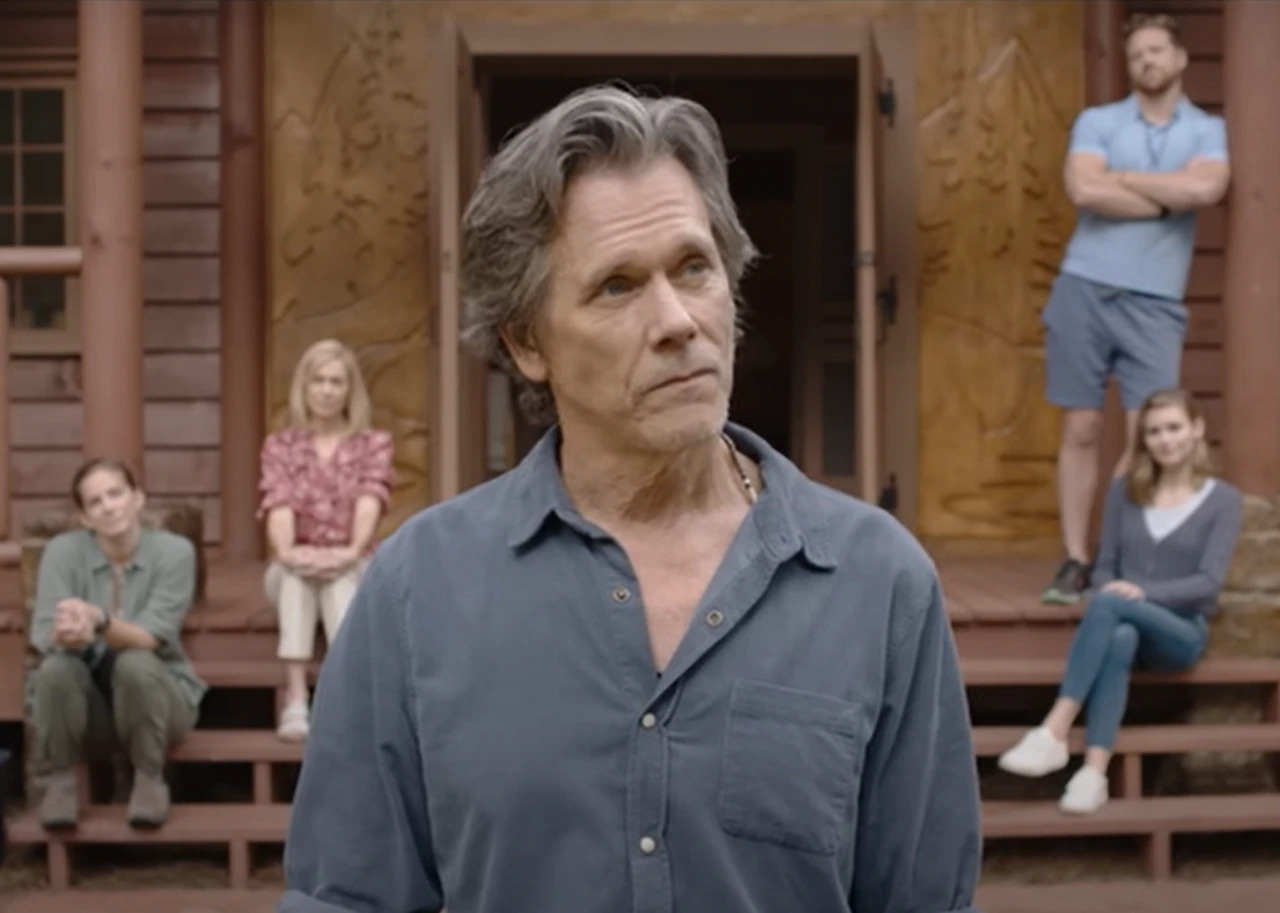For a particularly online subset of the queer community, the notion of a retro slasher set at a conversion camp and titled (I cannot stress this enough) they slash them is a wet dream. Horror has long been a genre the community clings to—whether this is the result of identifiable themes of isolation and social ostracism, or of overt gay shit (see also: NIGHTMARE ON ELM STREET 2). Couple that with the slasher’s inherent tendencies toward camp and you’ve effectively got gay catnip. So why, then, did John Logan’s straight-to-streaming THEY/THEM—on paper, a home run!—fail so spectacularly?
THEY/THEM, in short, follows the LGBTQ+ campers at Whistler Camp, run by husband-and-wife duo Owen and Cora Whistler (an admittedly assured Kevin Bacon and Carrie Preston, respectively), while a mysterious masked killer targets the camp. It’s a rather standard slasher conceit: get a bunch of kids in one secluded place, let an outsider wreak havoc, profit. From the opening sequences, it seems the film is on track for 104 minutes of fun, if paint-by-numbers, fun…
…until it forgets it’s a slasher entirely.
For the bulk of the first and second acts, you’d be forgiven for forgetting you turned on THEY/THEM and not a direct-to-video riff on THE MISEDUCATION OF CAMERON POST. The real horror the film seems to suggest is in the abuse of conversion therapy, which is all well and good, if it weren’t for the fact that:
- If you’re turning on a queer slasher called THEY/THEM (or, let’s be honest, if you have a Peacock subscription in the first place!) you’re well aware of conversion therapy’s horrific violence.
- Viewers were promised a FRIDAY THE 13TH riff and instead got BOY ERASED.
By the time an impromptu P!nk singalong rolls around—a sync choice that suggests no one involved in the film has met a gay person under the age of 40—the threat of a masked killer is all but absent entirely, pushed aside in favor of hopelessly earnest and shallow queer affirmation.

The failure to consider audience, as showcased by the P!nk sequence (the same song returns in the end credits for some reason,) is perhaps the film’s greatest shortcoming. Amidst growing popular resistance against milquetoast “love is love” rainbow capitalism, THEY/THEM is content to begin and end its politics at “born this way.” I’d be remiss not to point to the seminal BUT I’M A CHEERLEADER, still the defining work on conversion therapy. Twenty-three years after that film’s 1999 release, it continues to push boundaries. CHEERLEADER remains utterly radical and liberatory; compare that to THEY/THEM, which had over two decades to develop its politics, and the latter feels even more dead in the water. Certainly, I’m far from the only one to point to Babbitt’s film as the conversion therapy film in the same way I might deem GOODFELLAS the mob film or BLACK SWAN the dance film. This ubiquity only makes THEY/THEM’s utter disconnect from CHEERLEADER feel more damning and inexplicable. How, one might ask, could someone set out to make a film—nay, a slasher, a historically camp affair—about a conversion camp and fail to make even an oblique stylistic reference to the film that so essentially skewers the institution?
What BUT I’M A CHEERLEADER proves, with THEY/THEM as a compelling counterexample, is that holding an audience’s hand will not point them to decency. The bulk of your garden-variety homophobes and transphobes aren’t the type to openly sympathize with conversion therapy, endorse kicking children out of the home. Nor, more pressingly, will they take time out of their day to watch a film such as this. CHEERLEADER succeeds at being as downright scathing as it is because its approach is taking the piss out of these camps and the hatred that fuels them, instead of providing heavy-handed moralizing to an audience who frankly doesn’t need it.
Which perhaps points to the greatest issue with THEY/THEM: it simply isn’t fun. Slashers need not be overtly funny in a SCREAM sort of sense, but even the most earnest slashers succeed by nature of providing some sense of fun. Perhaps the kills are inventive, the group’s banter is quick and pointed, the sense of danger is deliciously imminent. At Whistler Camp, though, there are no stakes. There is no final girl. The body count is criminally low. The campers’ conversations feel like me on Tumblr in middle school talking about queerness. With a runtime just over 100 minutes, there’s no reason this shouldn’t have been a taut, if cheesy or slight, dose of adrenaline.
In a word? Under/whelming.















Comments